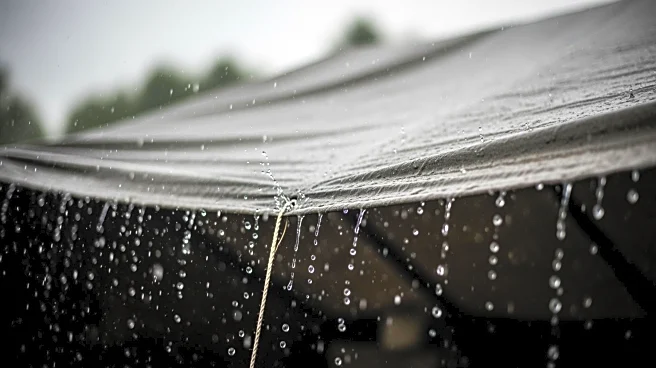What's Happening?
Heavy rain has flooded camps in Gaza, worsening the living conditions for displaced Palestinians. The inclement weather has turned roads into rivers and soaked families inside their tents, adding urgency to humanitarian concerns for the region's 2 million
residents. The crisis is compounded by the collapse of water and sewage systems, which were destroyed by Israeli strikes over the past two years. This has left hundreds of thousands of people in areas with inadequate sanitation. The United Nations reports that 90% of Gaza's population is displaced, with over 1.5 million people urgently needing emergency shelter assistance. Restrictions on relief materials by Israel continue to hamper humanitarian efforts, despite claims of aid deliveries.
Why It's Important?
The flooding in Gaza highlights the dire humanitarian situation faced by displaced Palestinians, exacerbated by infrastructure destruction and limited access to relief materials. The environmental disaster poses significant health risks due to the mixing of rainwater with sewage. The situation underscores the urgent need for international intervention and support to address the humanitarian crisis. The ongoing conflict and political tensions further complicate efforts to stabilize the region and provide necessary aid. The U.N. Security Council's upcoming vote on a stabilization force could influence future humanitarian and political developments in Gaza.
What's Next?
The U.N. Security Council is expected to vote on a U.S. proposal for an international stabilization force in Gaza. This proposal faces opposition from Russia, China, and some Arab countries. The deployment of such a force is a major obstacle in negotiations for a ceasefire and the disarmament of Hamas. Political tensions in Israel regarding Palestinian statehood could impact the resolution's progress. The humanitarian situation in Gaza remains critical, with hopes for improved conditions dependent on international support and political resolutions.
Beyond the Headlines
The flooding in Gaza not only highlights immediate humanitarian needs but also raises questions about long-term infrastructure development and political solutions in the region. The destruction of key infrastructure by Israeli strikes has long-term implications for Gaza's recovery and development. The political discourse around Palestinian statehood and international intervention could shape future governance and peace processes in the region.















